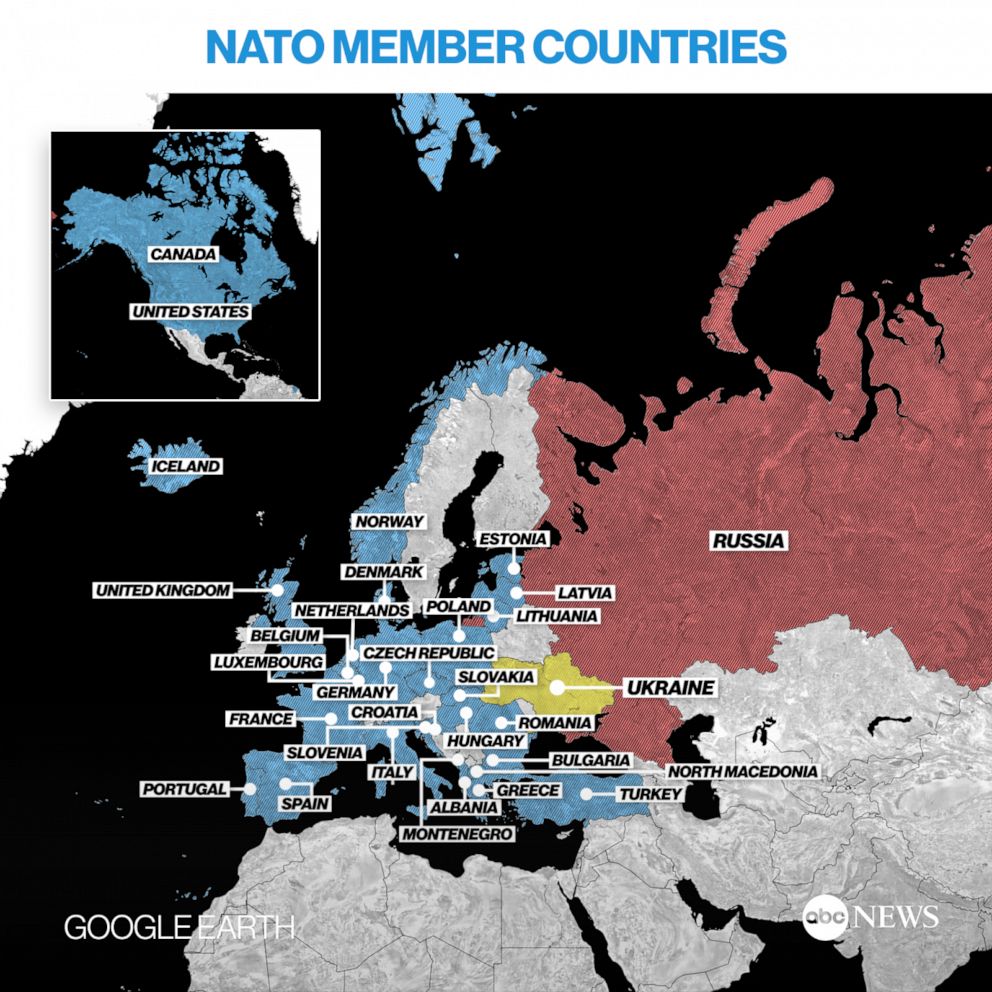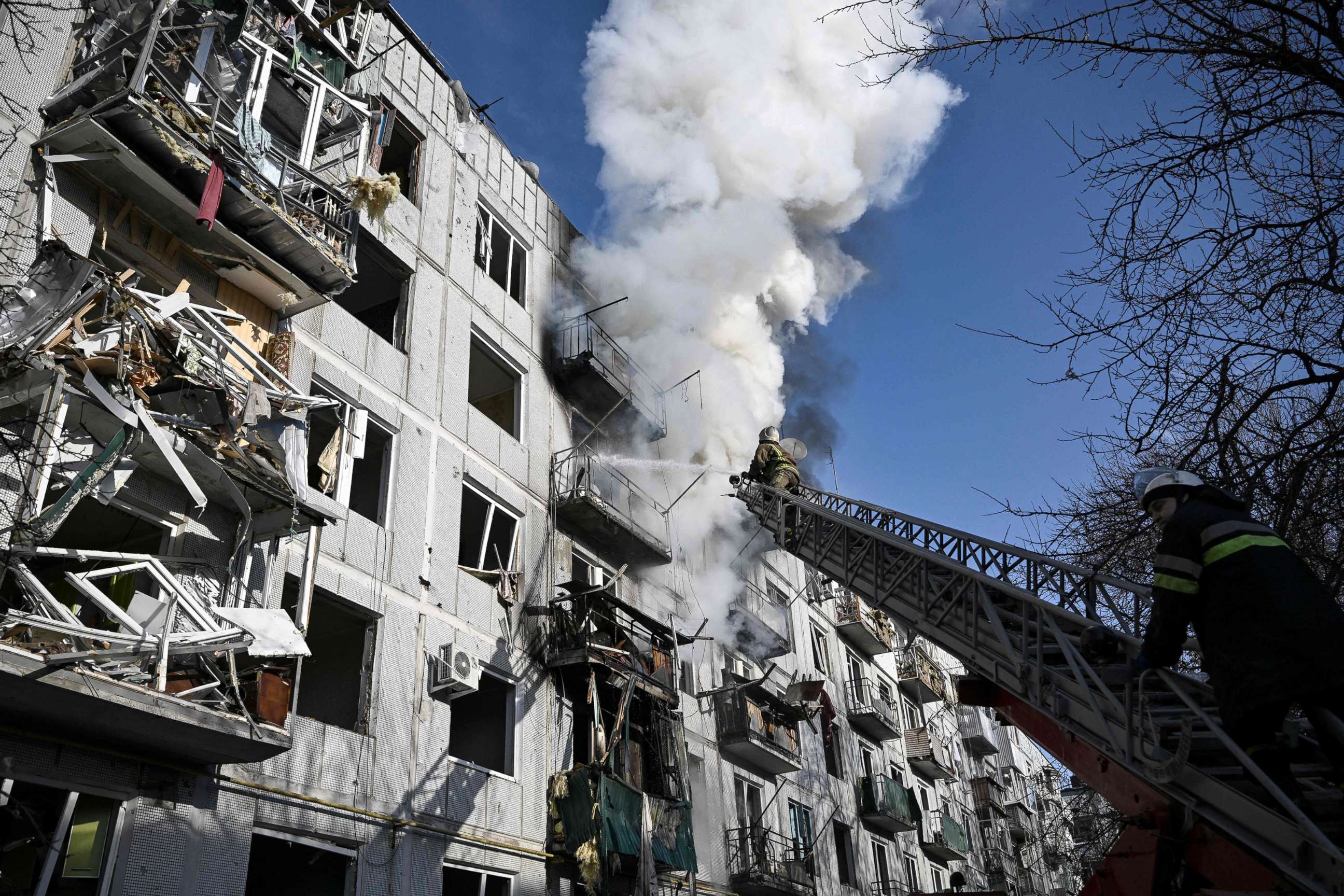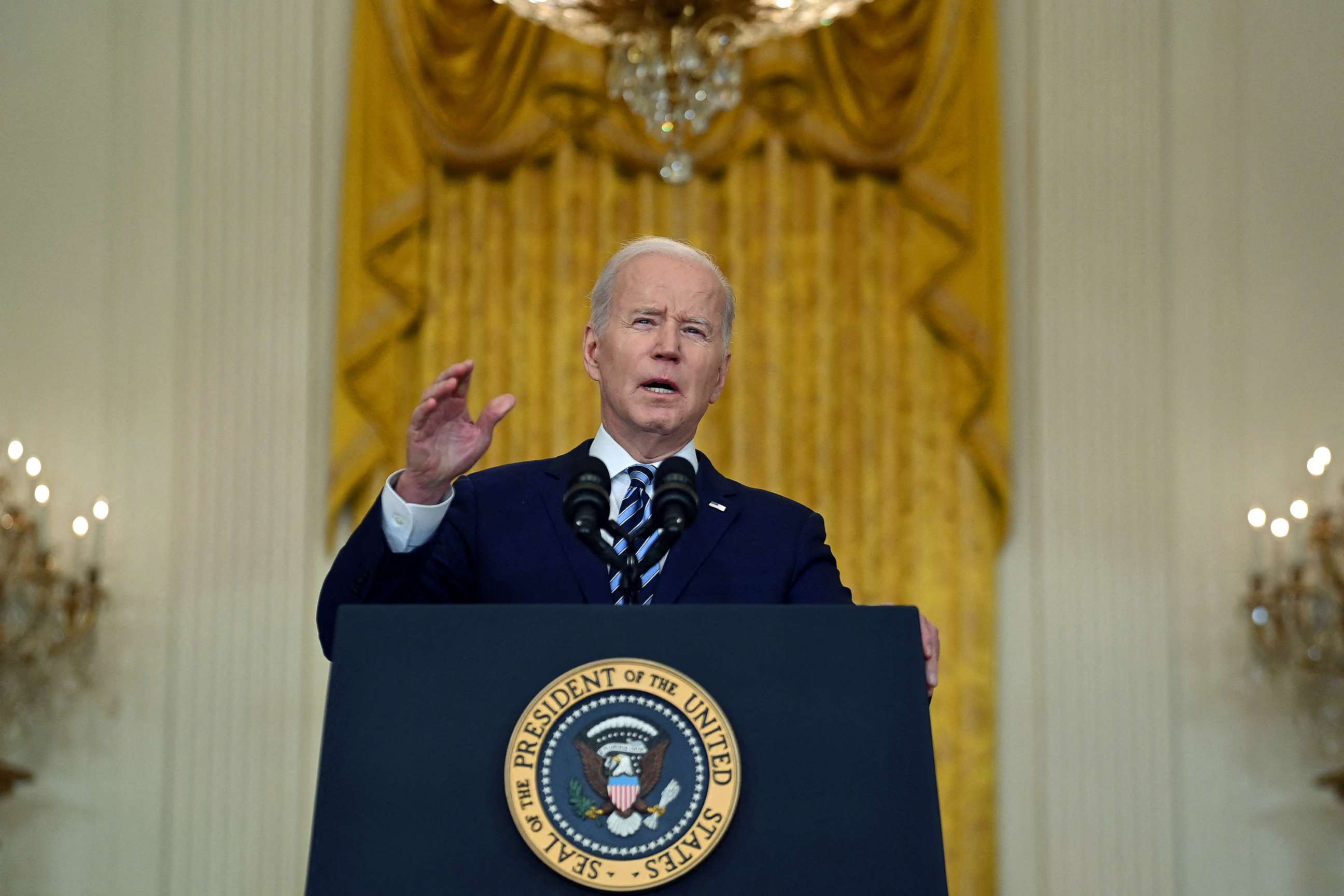How NATO factors into the Ukraine-Russia conflict
There are 30 NATO members, but Ukraine is not one of them.
Ukraine is not a member of NATO, though the international security alliance has been a key player in its ongoing conflict with Russia, which escalated to a full-scale invasion by Russian forces Thursday.
Since the United States helped form NATO, or the North Atlantic Treaty Organization, in 1949 to counter Soviet aggression in Europe, the alliance has grown to 30 member countries, including three former Soviet republics -- the Baltic states of Estonia, Latvia and Lithuania.
In 2008, NATO appeared to open the door to membership to two more former Soviet republics when its heads of government declared that Georgia and Ukraine "will become members of NATO."
Neither have formally received a pathway to eventual membership, with corruption concerns and a lack of consensus among members seen in part as holding back Ukraine's invitation. Russian President Vladimir Putin has demanded that Ukraine never join the alliance as he seeks to limit NATO’s presence in Eastern Europe.

Putin's military operation has prompted NATO allies, worried about further escalation, to issue sanctions meant to impact the Russian economy, bolster troops along the alliance's Eastern flank and repeatedly warn that an attack on one NATO member is an attack on all.
In the wake of Russia's attack on Ukraine, President Joe Biden announced that NATO will convene a summit Friday to "affirm our solidarity and to map out the next steps we will take to further strengthen all aspects of our NATO alliance."
Biden has repeatedly said the U.S. won't be sending troops to engage with Russia in Ukraine, though he has recently authorized the deployment of ground and air forces in Europe to support NATO's eastern flank allies -- Estonia, Latvia, Lithuania, Poland and Romania -- in response to Russian aggression. Following Thursday's attack on Ukraine, Biden said he has authorized additional forces to deploy to Germany as part of NATO's response. According to a senior Defense Department official, 7,000 service members will be deployed to Germany in the coming days.
"Our forces are not going to Europe to fight in Ukraine but to defend our NATO allies and reassure those allies in the East," Biden said during an address Thursday. "As I made crystal clear, the United States will defend every inch of NATO territory with the full force of American power."
Article 5 commitments
During a video address days before he announced a military operation in Ukraine, Putin linked the current crisis directly to Russia's NATO demands, which include a guarantee that NATO stop expanding to the East and pull back its infrastructure from Eastern European countries that joined after the Cold War. He accused the U.S. and NATO of ignoring Russia's demands and blamed the West for the current crisis in Ukraine.

The potential impact of the Ukraine conflict on U.S. interests is considered "significant," by the Council on Foreign Relations, which said in part that the conflict "risks further deterioration of U.S.-Russia relations and greater escalation if Russia expands its presence in Ukraine or into NATO countries."
"I think we shouldn't get fixated only on Ukraine," Doug Lute, a former U.S. ambassador to NATO and ABC News contributor, told ABC News Live following Putin's speech. "[Putin's] ambitions beyond that are to essentially rewind the clock 30 years and reverse the progress made in Western Europe, certainly Central and Eastern Europe, and if possible, break the ties between the United States and its European allies."
Were the conflict to go beyond Ukraine and impact NATO members, that could lead the organization to invoke its mutual self-defense clause -- what's known as Article 5 of the NATO treaty, which states that "an armed attack against one or more of them in Europe or North America shall be considered an attack against them all." If one ally is attacked, the others will respond with necessary action, including armed force, "to restore and maintain the security of the North Atlantic area."

The first and only time NATO invoked Article 5 was in response to the terrorist attacks of Sept. 11, in support of the U.S. On Thursday, Biden said the U.S. and its NATO allies "will meet our Article 5 commitments" if necessary in response to Russian aggression, though they are seeking to deescalate the conflict through increased sanctions.
"If [Putin] did move into NATO countries, we will be involved," Biden told reporters. "The only thing that I am convinced of is -- if we don't stop now, he'll be emboldened. If we don't move against him now with these significant sanctions, he will be emboldened."
U.S. officials see Article 5 as another deterrent for any further Russian aggression.
"Is it a possibility that Putin goes beyond Ukraine? Sure, it's a possibility, but there's something very powerful standing in the way of that -- that's something we call Article 5 of NATO," Secretary of State Antony Blinken said in an interview with ABC's David Muir on Thursday. "The president's been very clear that we will defend every inch of NATO territory. I think that's the most powerful deterrent against President Putin going beyond Ukraine."
Cyberattack question
One "gray area" around NATO's Article 5 response is Russian cyberattacks and their impacts beyond Ukraine, according to U.S. Sen. Mark Warner (D-Va.), who oversees the Senate Select Committee on Intelligence.
"The real deal is if they suddenly decide to shut down all the power in Ukraine, chances are that may shut down the power in eastern Poland, where American and NATO troops are located," Warner told reporters Thursday. "If they shut down the hospital systems in Poland, and people die because you can't operate, we are suddenly outside of the hypothetical realm of what could constitute what's called an Article 5 violation, where if you attack one NATO nation, you attack all 30 NATO nations. And these hypotheticals become a reality."
If Russia responds to NATO allies' sanctions with cyberattacks, "we are again going into uncharted territory," he said.
Last year, NATO said the alliance would consider whether to invoke Article 5 in response to a cyberattack "on a case-by-case basis."
When asked by ABC White House correspondent MaryAlice Parks on Thursday if the White House thought a cyberattack against a NATO member would trigger an Article 5 response, White House press secretary Jen Psaki said that'd be a "point of discussion."
"That, again, is up to the NATO alliance to determine, but obviously a cyberattack does constitute an attack, so that would certainly be a point of discussion among the NATO members," she said.
ABC News' Ben Gittleson and Patrick Reevell contributed to this report.




